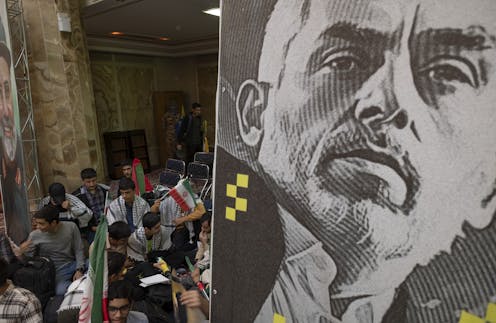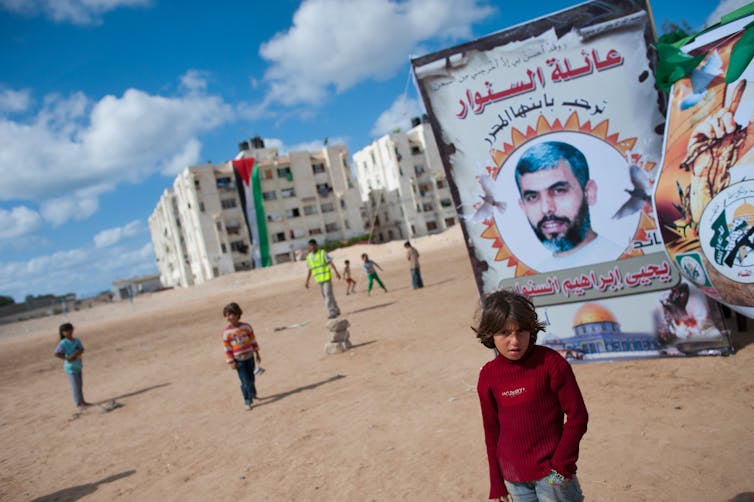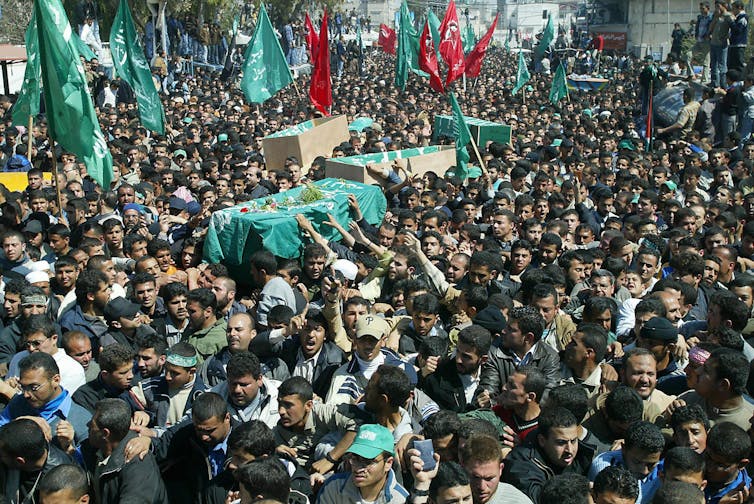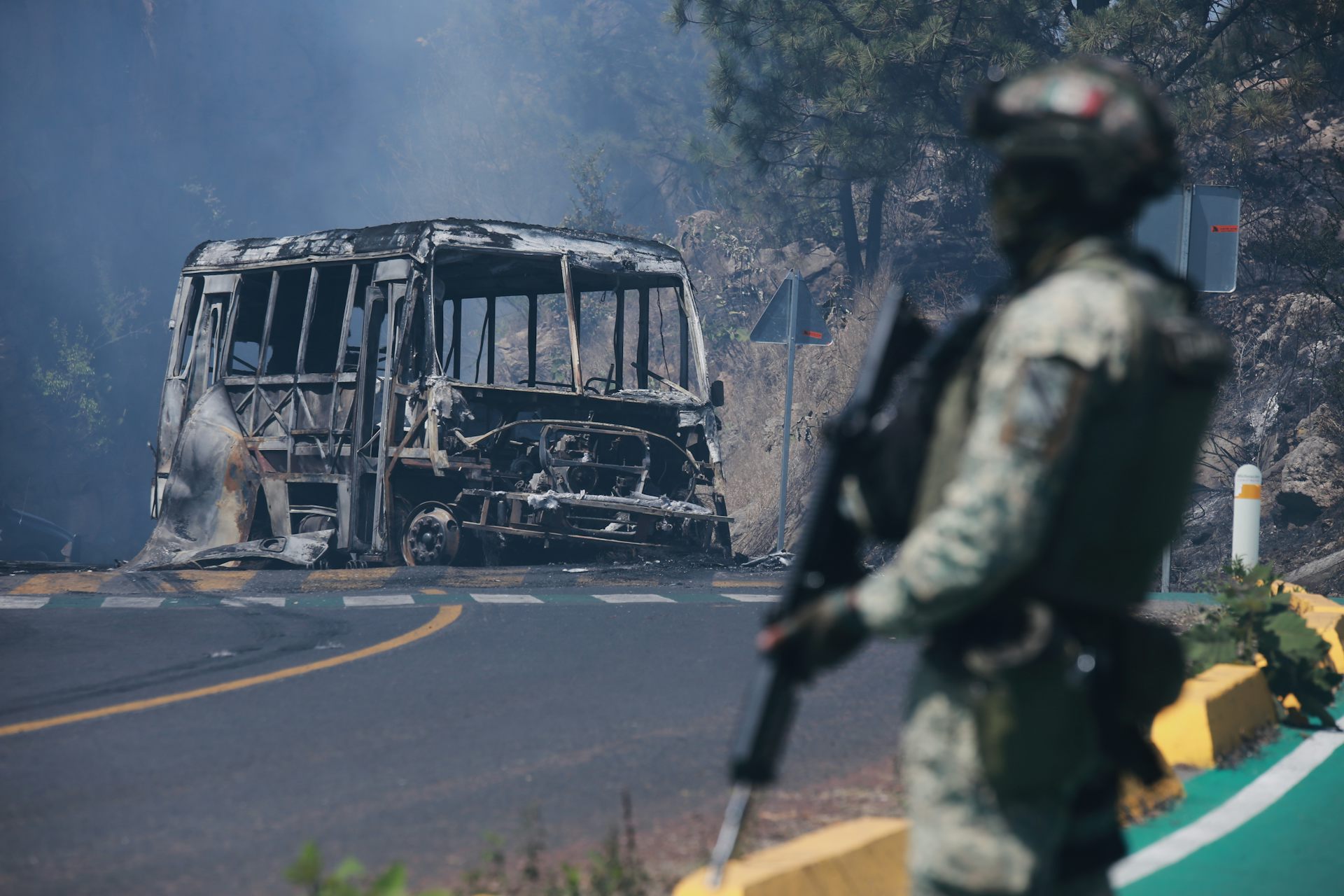Hamas at a crossroads: Sinwar’s death leaves a vacuum; Israeli actions make it harder to fill with a
Where next for the militant group that is weakened, alienated from Arab moderate governments and increasingly unpopular among Gazans?

Hamas will soon begin the process of deciding who will next head the militant Palestinian organization following the Oct. 16, 2024, killing of former leader Yahya Sinwar – but the task won’t be easy, or quick.
What makes his replacement as chairman of Hamas’ political bureau a hard one is that since the Oct. 7, 2023, attack – for which, Sinwar was seen as the main architect – Israel has killed many of the senior political and military commanders that would be in line to replace him, or at least be tasked with determining the future direction of Hamas.
Just two months before Sinwar’s death, his predecessor in the role, Ismail Haniyeh, was assassinated in Tehran, purportedly in an Israeli operation. Meanwhile, Hamas’ military chief, Mohammed Deif, was killed in July and Saleh Arouri, a senior Hamas official and deputy of Haniyeh, was earlier killed in a Beirut drone strike.
As an expert on Palestinian politics, I believe the death of Sinwar will leave a vacuum in Hamas that will likely last for many months, if not years. The question is whether the group eventually opts for a leader who continues Sinwar’s hard-line legacy or tries to moderate Hamas’ approach.
Sinwar’s legacy
Sinwar’s uncompromising stance has shaped not only Hamas but also the Palestinian cause.
Born and raised in the Gazan refugee camp Khan Younis, Sinwar joined Hamas in the early days of the organization, which was established in 1987. He quickly rose through the ranks and was responsible for establishing Majd, a security agency within the military wing of Hamas responsible for apprehending and executing Palestinian collaborators with Israel.
Sinwar confessed to Israeli interrogators to have killed and buried 12 suspected collaborators – earning him a life sentence in Israeli jail. He served 22 years before being released in a prisoner-swap deal in 2011, which also saw the release of Israeli soldier Gilad Shalit.

A few years later, he made it to the top of Hamas, serving as chairman of Hamas’ political bureau in Gaza since 2017. After Haniyeh’s assassination in late July, 2024, Sinwar assumed overall leadership.
Throughout, Sinwar has been a proponent of Hamas’ hard-line stance on Israel – an approach that won him respect within the organization.
Less than a year after assuming power in Gaza, Sinwar endorsed the “Great March of Return and Breaking the Siege” protests of March 2018 along Israel-Gaza borders. The demonstrations – during which Israeli troops shot dead scores of Palestinian protesters – succeeded in galvanizing international support for the Palestinian cause.
The protests may have also contributed to Israel’s decision in August of that year to allow Qatar to begin making monthly payments of millions of dollars to Hamas and Gaza in an attempt to defuse and de-escalate tensions.
More concessions came as Israel tried to satisfy Sinwar and avoid the further escalation of unrest in Gaza, including allowing Gazan laborers to work in Israel for the first time since Israel’s disengagement from Gaza in 2005.
But Sinwar had less success in getting Israel to agree to releasing the fellow Hamas members he had left behind in Israeli jails and had vowed to get out. He tried many times to strike a deal for the bodies of two Israeli soldiers and two civilians, but Israel was not interested. That failure probably contributed to Hamas’ decision to attack Israel on Oct. 7, 2023.
How Hamas reacts to blows
The killing of Sinwar has weakened Hamas, but Hamas as an idea and an ideology is harder to kill.
Israel knows this. In March 2004, an Israeli missile struck and killed Hamas’ founder and spiritual leader Sheikh Ahmed Yassin; a month later, his successor Abdel Aziz Rantisi was also killed.
But those deaths did not weaken Hamas. On the contrary, the organization grew more radical. A younger and more defiant leadership took over the organization, which fought Israel repeatedly from 2008 onward, culminating int the Oct. 7 attacks.

Hamas’ reaction to that double blow may give an insight into the current decision-making process now.
The killing of Yassin was an opportunity for Hamas to revise its military tactics against Israel – which then mainly consisted of suicide bombings against Israeli civilians.
But in the end, Hamas vowed to continue the violent struggle against Israel.
Moderation or radicalization?
Hamas is again at a crossroad. It is weakened, alienated from Arab moderate governments and increasingly unpopular among Gazans.
But throughout the last year of conflict it has remained defiant. Footage of an injured Sinwar, fighting to the last and trying to down an Israeli drone with a stick, has only added to his legacy, making him a legend to many supporters.
The new leadership will have to chose between continuing down the road of radicalization that Sinwar represented or opting for moderation.
But Israel is not making that second option any easier.
Israeli Prime Minister Benjamin Netanyahu’s only offer to Hamas is total surrender – he has not left the group any face-saving exit.
So it seems likely that Hamas will choose to continue the fight.
As such, one of the most likely candidates for post-Sinwar leadership of Hamas is Khalil al-Hayya, a Palestinian politician who has served as the deputy chairman of the Hamas political bureau since August 2024.
Al-Hayya is known for his hawkish attitude toward the idea of Hamas’ reconciliation with rival Palestinian group Fatah, and his hawkish statements on Israel. After Sinwar’s death, he vowed to continue the fight against Israel, an indication that the spirit of Sinwar will continue to guide Palestinian resistance in the coming years.
His main challenger for the role of leader is Khaled Mashaal, who served as chairman of Hamas’ political bureau from 1996 to 2017 and currently serves as its chairman in exile.
Mashaal, who has a large network of regional and international allies, is considered a more moderate option. He was responsible for drafting Hamas’ 2017 manifesto – seen as a departure from the earlier, more radical and blatantly antisemitic 1988 charter.
Collective leadership: Room for maneuver?
But a decision on who will assume the role of leader is not expected immediately. Hamas appears more inclined toward collective leadership until scheduled elections in March 2025, if conditions permit.
In the meantime, a five-member committee that was formed in August following the assassination of Haniyeh will take over decision-making. The committee is tasked with “governing the movement during the war and exceptional circumstances, as well as its future plans,” and the new committee is authorized to “make strategic decisions,” according to Hamas sources who spoke to Agence France-Presse reporters.
Collective leadership of this sort would seemingly indicate that at present Hamas sees no single person as being able to fill the vacuum left by Sinwar.
It would also give Hamas potentially more room to maneuver regarding negotiations with Israel and regional players, as some members of the committee are seen as acceptable faces to moderate Arab governments.
Collective leadership also provides Hamas with a survival mechanism, making it harder for Israel to claim the type of success it has so far achieved in assassinating named Hamas “leaders.”
No doubt, Israel has weakened Hamas with this strategy – notably with the killing of Sinwar. And while the assassination of leading Hamas figures does not constitute “total victory” over the group, as Israel wants, it does make the choice in choosing the next leader that much harder for Hamas.
Mkhaimar Abusada serves as deputy chairman on the board of directors at the Palestinian Center for Human Rights and is a board member at the Independent Commission for Human Rights.
Read These Next
Violent aftermath of Mexico’s ‘El Mencho’ killing follows pattern of other high-profile cartel hits
Members of the Jalisco New Generation Cartel have set up roadblocks and attacked property and security…
Crowdfunded generosity isn’t taxable – but IRS regulations haven’t kept up with the growth of mutual
Some Americans are discovering that monetary help they received from friends, neighbors or even strangers…
Algorithms that customize marketing to your phone could also influence your views on warfare
AI systems are getting good at optimizing persuasion in commerce. They are also quietly becoming tools…





